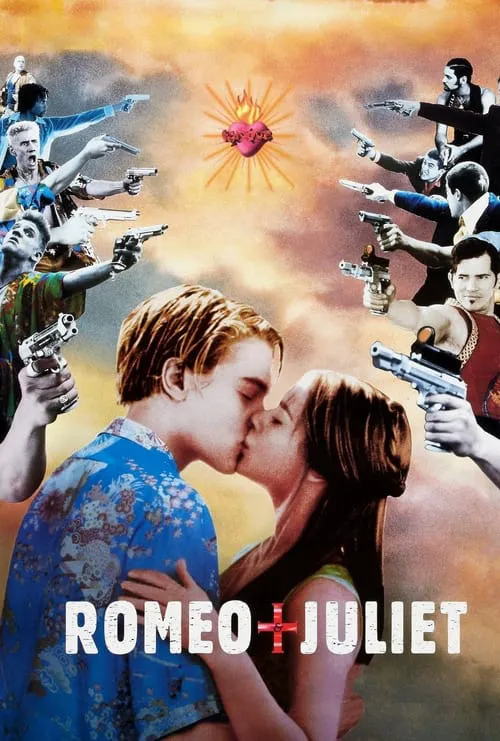Romeo + Juliet

Plot
Set against the vibrant backdrop of Verona Beach, a modern-day Los Angeles suburb, Baz Luhrmann's Romeo + Juliet is a visceral, hyper-stylized adaptation of William Shakespeare's timeless classic. Within this sun-baked world of reckless abandon and deep-seated animosity, Luhrmann transposes the eponymous pairs' star-crossed love story, setting the tone for a ravishing romance marred by familial discord and senseless violence. The Montagues and Capulets, two rival houses, have transported their vendetta to Verona Beach, forever entwining their fate in a cycle of hatred and retribution. Against this seething backdrop of tension and hostility, Romeo, the passionate, romantic Montague, crosses paths with Juliet, the lovely, innocent Capulet, at a impromptu party. Their chance encounter sets in motion a chain of events that would irrevocably shape the destiny of the two warring families. Luhrmann cleverly reinvents the characters in a way that honors their original Shakespearean incarnations while providing a fresh, modernized perspective. Romeo, beautifully portrayed by Leonardo DiCaprio, is a brooding, emotional teenager; his wild heart beats fast with desire, his eyes ablaze with passion. Romeo's devotion to his newfound love is unwavering, and his feelings are immediately reciprocated by Juliet, the radiant, free-spirited beauty played by Claire Danes. As the two lovers steal snatched moments together, their love blossoms into an all-consuming affair that feels inevitable, yet perpetually doomed. When Romeo and Juliet fall in love, the very fabric of their worlds seems to disintegrate, as if the universe is conspiring against their desired happiness. Baz Luhrmann's clever and audacious reimagining of Verona Beach foregrounds its sleek, new-age aesthetic, imbuing the movie's visuals with a fresh and innovative energy. Luhrmann's bold choices convey an immediacy that propels the audience into the visceral heart of the narrative, blurring the lines between fantasy and reality. Luhrmann's utilization of television newscasts provides a poignant commentary on the society that this society inhabits, one in which characters are bound by the necessities that govern this distinct social environment. The film's tone is unambiguously divided into two contrasting parts: a gaudy, ostentatious facade of superfluous splendor, and a gut-wrenching emotional core where love, pain and devotion go through turmoil-ridden life struggles. Luhrmann's film gets to the heart of Shakespeare's tragic love, unfurling in the way poignant moments in Verona Beach shake out, intensify or subside, ultimately plunging the heart-crushing finale on display. In his bold reimagining, Luhrmann transposes the Bard's classic tragic finale, replacing the age-old family animosity with a brazen shootout in an abandoned car or water tank, which symbolizes self-destruction and mortal urgency that transcends space and background. The director spares his audience not a single visual minute, ensuring that scenes, no matter how ominous, remain alive with electric energy. During Lucien's scathing attack, the imagery remains as striking, as forlorn, and most tragically devastating. The movie, while holding fast to Shakespeare's poetic speech and style of story-telling, paints its own richly variegated atmosphere, an exercise that is full of dramatic verve, emotion, romance, and a love-filled core.
Reviews
Recommendations

